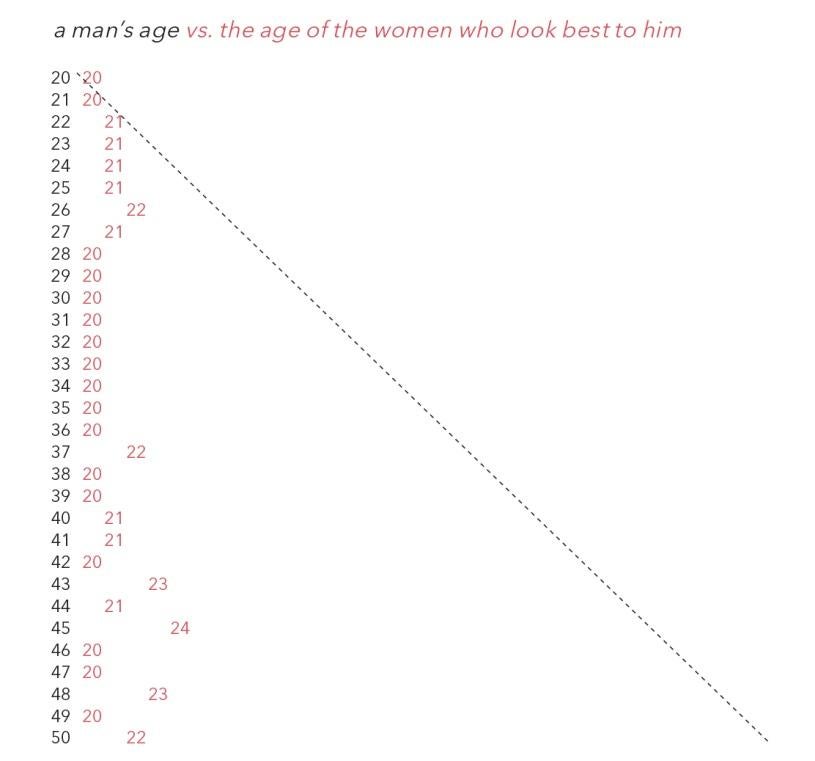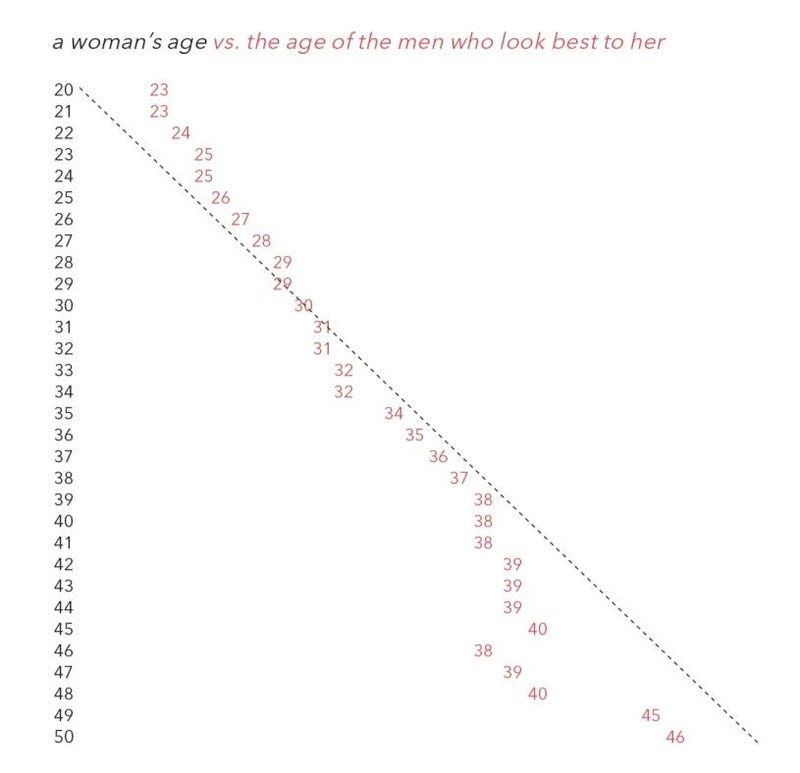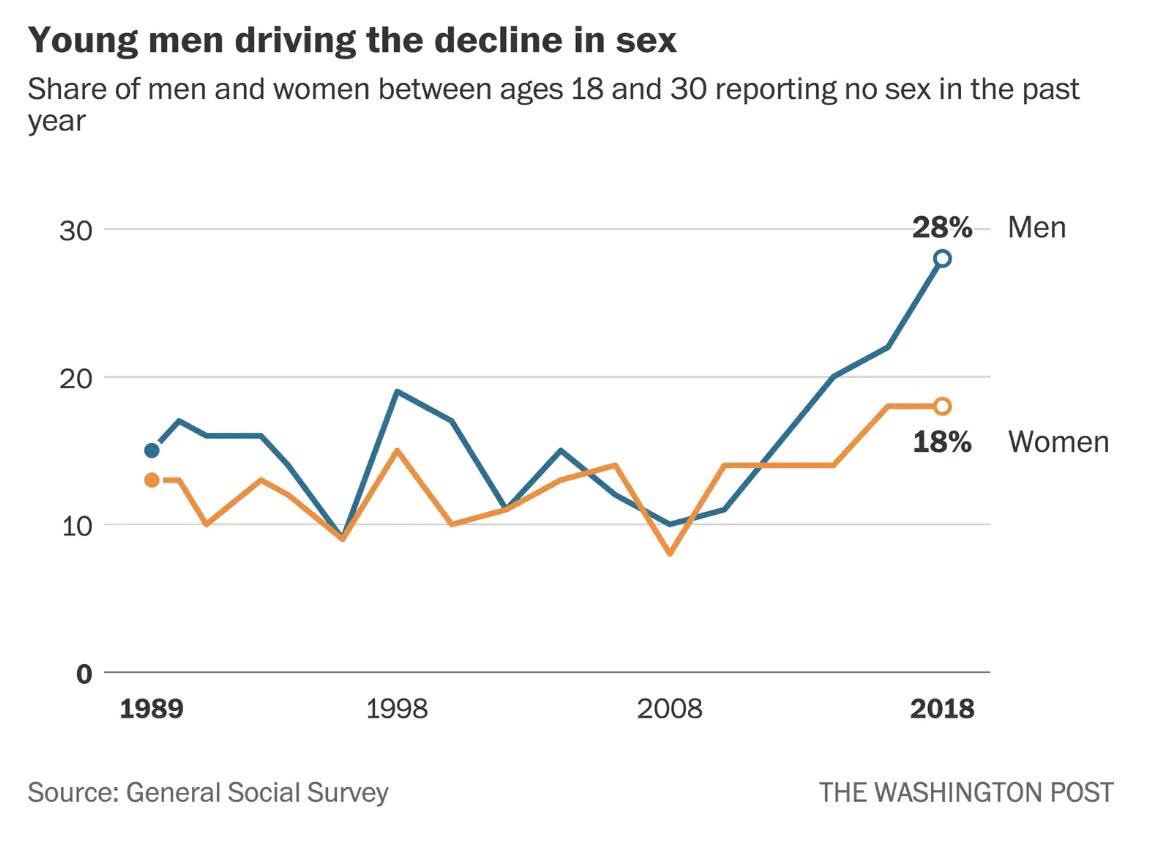ronburgundy
Contributor
So, it will surprise no one here to learn that men of all ages prefer the looks of women in the early 20's. IOW, men never change in their sexual attraction to women and like the same age women when they are 50 as they did when they were 20.
It may or may not surprise you to learn that women of all ages prefer the looks of men close to their own age. Women's tastes in men change in correspondence with their own age such that at age 20 women like men around 21, while women at age 50 like men around age 46.
The founder of OK cupid published some data from his site based upon about 10 million users who as part of their attempts to find dates are asked about their preferences. Below are the graphs that show what I just described.


This is NOT a thread about whether this difference in attraction is biologically based or evolutionary adaptive. Please start a separate thread for that argument.
This is a thread about the cultural/social impact that these preferences could have, regardless of where the preference originate from.
Even if these differences in preferences are biological, once these preference exist, they become part of the social/cultural environment that then has other additional impacts on people's behavior and can create other gender differences that themselves may have little direct genetic basis.
Imagine you are a 20 year old person and almost every person who is a possible opposite sex mating partner no matter their age thinks you are at your most attractive now and you will rapidly decline in appeal. Everywhere you go where there are people of all ages of both sexes, you are among the most attractive to almost all the opposite sex there and you'll likely be acutely aware of it. Meanwhile, all the older members of your own sex are also acutely aware it too, likely causing some negative feelings towards you.
Contrast that with being a 20 year old and only the possible mates around your age find you most attractive, but older possible mates do not. As you age, which subset of possible mates find you most attractive ages with you. Everywhere you go where there are various ages of both sexes, you are only the focal attraction of a subset of potential mates and older members of your sex also have their own subset of potential mates who find them attractive.
No matter one's gender, it is likely that such drastically different social contexts would impact many aspects of one's psychology, self evaluations, sexuality, and how one views and interacts with members of one's own and the opposite sex.
And while people of both sexes do vary in attractiveness in ways that are independent of age, the data show that on average females experience the social situations closer to the former while males experience the social situation closer to the latter.
In addition, that is just the extreme difference of what it is like to be a 20 year old female vs. male. The male experience remains somewhat stable, b/c there is an ever changing subset of women who are most attracted to his age group. But the female experience changes drastically, such that an exponentially fewer number of potential mates are attracted to their age group. And as young women, they know this is coming toward them.
Although the effects of these different social experiences seems likely to be large and impact many things, it is difficult in the abstract to know exactly how. But it is worthwhile speculating on what these impacts might be and keeping these possible effects caused proximally by "environmental" when thinking about various gender differences of many sorts.
It may or may not surprise you to learn that women of all ages prefer the looks of men close to their own age. Women's tastes in men change in correspondence with their own age such that at age 20 women like men around 21, while women at age 50 like men around age 46.
The founder of OK cupid published some data from his site based upon about 10 million users who as part of their attempts to find dates are asked about their preferences. Below are the graphs that show what I just described.


This is NOT a thread about whether this difference in attraction is biologically based or evolutionary adaptive. Please start a separate thread for that argument.
This is a thread about the cultural/social impact that these preferences could have, regardless of where the preference originate from.
Even if these differences in preferences are biological, once these preference exist, they become part of the social/cultural environment that then has other additional impacts on people's behavior and can create other gender differences that themselves may have little direct genetic basis.
Imagine you are a 20 year old person and almost every person who is a possible opposite sex mating partner no matter their age thinks you are at your most attractive now and you will rapidly decline in appeal. Everywhere you go where there are people of all ages of both sexes, you are among the most attractive to almost all the opposite sex there and you'll likely be acutely aware of it. Meanwhile, all the older members of your own sex are also acutely aware it too, likely causing some negative feelings towards you.
Contrast that with being a 20 year old and only the possible mates around your age find you most attractive, but older possible mates do not. As you age, which subset of possible mates find you most attractive ages with you. Everywhere you go where there are various ages of both sexes, you are only the focal attraction of a subset of potential mates and older members of your sex also have their own subset of potential mates who find them attractive.
No matter one's gender, it is likely that such drastically different social contexts would impact many aspects of one's psychology, self evaluations, sexuality, and how one views and interacts with members of one's own and the opposite sex.
And while people of both sexes do vary in attractiveness in ways that are independent of age, the data show that on average females experience the social situations closer to the former while males experience the social situation closer to the latter.
In addition, that is just the extreme difference of what it is like to be a 20 year old female vs. male. The male experience remains somewhat stable, b/c there is an ever changing subset of women who are most attracted to his age group. But the female experience changes drastically, such that an exponentially fewer number of potential mates are attracted to their age group. And as young women, they know this is coming toward them.
Although the effects of these different social experiences seems likely to be large and impact many things, it is difficult in the abstract to know exactly how. But it is worthwhile speculating on what these impacts might be and keeping these possible effects caused proximally by "environmental" when thinking about various gender differences of many sorts.
Last edited:

